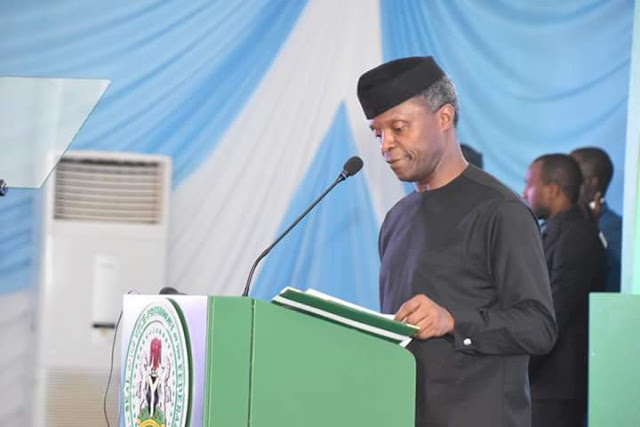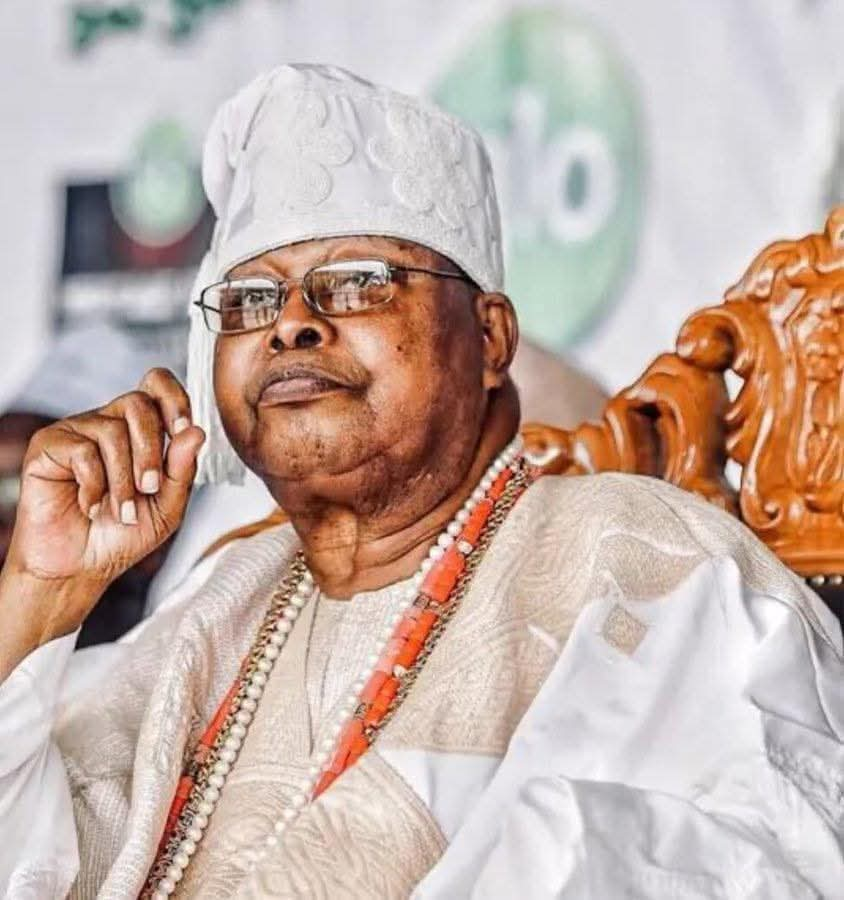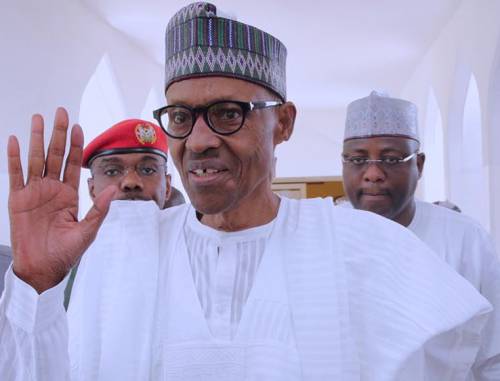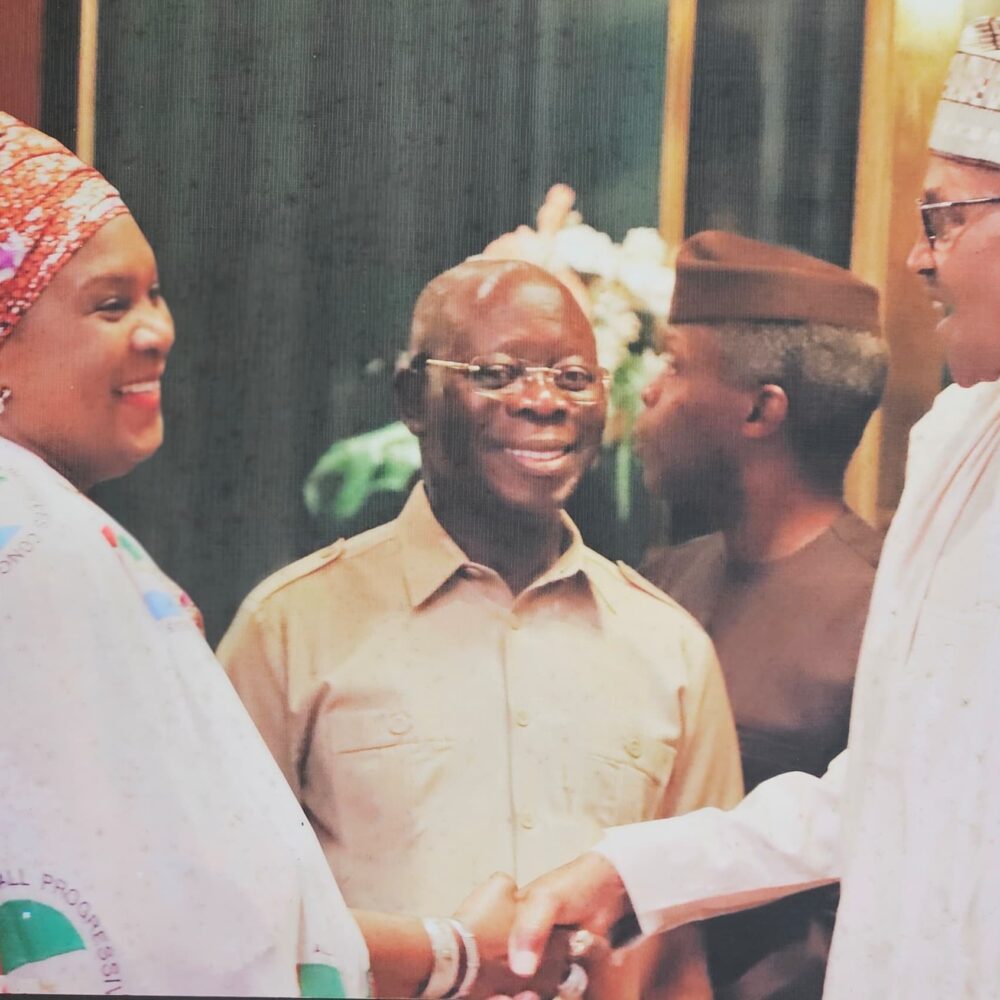The Vice President, Prof. Yemi Osibanjo has asked government at all levels to invest more on Health and well being of Nigerians along with quality Education so as to guarantee government objectives in the realization of SDGs.
Professor Osibanjo dropped the message on Thursday at the banquet hall of the state house, Presidential Villa, Abuja during the maiden launch of Goal 3 and 4 independent evaluation reports , the first of its kind which dwelled on performance of Health and Education programs in Nigeria.
He said Nigeria was one of the country at the forefront of robust institutional framework geared towards realizing SDGs goals with Health and Education at the front burner since 2019 aside Addis Ababa that debuted in 2018.
“Today’s event marks the end of a long process which began in December 2018, when at the African regional workshop on Sustainable Development Goals evaluation in Addis Ababa, Nigeria showcased the robust institutional frameworks established to guarantee effective implementation of the SDGs in Nigeria. Since then, the Office of the senior Special Assistant to the President on SDGs, in close collaboration with relevant ministries, embarked on an independent evaluation of two priority SDGs, SDG, three on quality, health and wellbeing for all and SDG four on qualitative and inclusive education and lifelong learning for all. These two country led evaluations were technically and financially supported by UNICEF Nigeria.”Osinbajo said.
Osibanjo emphasized the commitment of SDGs in Nigeria after the convening at the 70th UN General Assembly to chart a new template from MDGs to SDGs in cahort with 2020-2030 development agenda.
“Implementation of the Sustainable Development Goals Nigeria began shortly after the adoption of the 2030 Agenda for Sustainable Development by world leaders at the United Nations General Assembly in September of 2015.”he added.
SDGs according to the Vice President, opened up a new vista to end extreme poverty, protect the planet and also achieve inclusive sustainable development meant to distance 100 million Nigerians with a decade target, hence efforts by government to achieve it’s goals.
“With the adoption of the agenda and the SDGs we have set for ourselves a vision to end extreme poverty and to safeguard our planet by the year 2030. Achieving inclusive sustainable development is an objective that aligns closely with our government’s desire to bring the 100 million people out of poverty in 10 years. It is for this reason that the federal government of Nigeria established a number of programs to support the acceleration of the achievement of the SDGs.”he stated.
He commended the program handlers in Nigeria for its provision of leadership and technical supports in the operation of SDGs through a well thought out program to improve Health, Education, with more efforts to improve the current stirdes recorded in the country with stakeholders contributions.
“The Office of the Senior Special Assistant to the President on SDGs, has continued to provide technical leadership in the operationalization of the SDGs. The findings contained in these strategic evaluations reinforce the evidence for improving health and educational outcomes in Nigeria, and highlight how all stakeholders, governments, development partners and civil society can best address systemic gaps and challenges.”
The imperative of the launch was to access the two evaluations to strengthen policies that supports the SDGs using the two Goals as a better guide.
“So this official launch today comes with a responsibility for us to intentionally use the key findings of the two evaluations to strengthen policies that support the achievement of the SDGs. On SDG three, quality health and wellbeing for all, the report notes that Nigeria has a suitable institutional framework. Key among them includes the Basic Healthcare Provision Fund, and the National Health Insurance app, both of which address health financing as a means of improving access to care.
“The report notes that although there is considerable effort by national health programs to increase access to health services, there are also strong barriers to the delivery of these services, mainly linked to the quality of care and availability of equipment and essential medicines.
“With government lean resources in the previous years, he appeal for more concerted efforts and more fundings both at national and sub national levels to bridge the gap of the current and recurrent expenditures in the sector.
“Even though government expenditure of double between 2010 and 2017. Out of Pocket expenditure remains high in Nigeria 74.3% on average between 2010 and 2017 and wide variations exist across the 36 state and the FCT. Indeed, significant gaps between health budgets and health expenditure exist across the entire country.
“One of the most important actions to be taken to achieve the SDG three is to create a self sustaining financial architecture, universal health coverage, improved clinical governance and harmonious health workforce, all of which would prepare for the challenges of the 21st century. This must be accompanied by strengthening mechanisms at the level of the state government to resource mobilization.”Osinbajo further explained.
He urged for more actions from the critical stakeholders to develop a blueprint to ensure the implementation towards mitigating the negative impact on the society.
“Incidentally, the report acknowledges that many states and non state actors, both local and external, are already working on some of these recommendations. We look forward to the full and successful implementation of the recommendations a holistic approach across the four thematic areas in a way that maximizes positive health impacts for the poor and the most vulnerable groups in Nigeria.”he said.
Professor Osibanjo stated that the significance of two Goals cannot be overemphasized, with the aim to ameliorate not only social problems, but stratification towards creating social security on its policies and strategies, saying more needs to be done in the area of planning, financing among many other demands.
“On SDG four qualitative and inclusive education. And right now when we follow the report noted that engaged on sector of policies and strategies, both at the federal and state levels are aligned with SDG 4.1 targets, particularly in the formulation of the plans. Significantly, the report noted that education financing is much lower than in other African countries, and that transparency around education, budgeting and spending needs to improve. Similarly, governance issues of the federal state and local governments remain at the heart of education provisioning in Nigeria. For example, overlapping responsibilities and coordination between state and the Universal Basic Education boards the suburbs, and states ministries of education was reported to be weak.
“On specific indicators, the net enrolment rate shows that just over two thirds of Nigerian children or 69.9% were attending school in 2019. regarding quality 2020 data indicates deep challenges with respect to reading and numeracy abilities. On access, findings revealed that inadequate economic resources remained a barrier to access or more so for girls and boys. Indeed, socio cultural beliefs and practices as well as insecurity in some parts act as additional barriers.”he said.
Revolving government programs introduced to mitigate the negative impact on education by the present administration has increased enrollments, improvement in learning outcomes, with particular attention on gender equality, attention to girls and women inspite the negative impact of COVID, the global pandemic that ravaged the entire world.
“Although positively, the national homegrown school feeding programme helped increased school enrollment, and also resulted in this slight improvement in learning outcomes. It also noticed that government policies have demonstrated attention to gender equality, and the empowerment of girls and women.
However, despite the emphasis of girls education, completion rates for girls continues to lag behind boys overall, and comparisons of learning results from between baseline studies, and the SDGs evaluation shows little progress in closing the gender gap. The negative impact of COVID-19 will likely be greater for girls than for boys.”
The need for rejig of the education sector through introduction of new program and agenda for quality education being propounded by stakeholders will not be out of place, as it will not only improve, but stabilize all other efforts of government and critical areas, Osibanjo said.
“On these key findings, the evaluation report suggests the need to initiate a collective consultative process to develop a new education sector strategy plan 2023 to 2039, with a theory of change, and accompanying results framework for the Nigeria basic education sector that is gender responsive, there is a need to delineate specific policies and strategies that go beyond education for all to strategically target the most vulnerable. These policies must recognize the structural barriers that keep children out of school, such as economic hardship, distance from schools, insecurity, and unsafe conditions, socio cultural barriers.”
“On education financing, building the commitment and incentive necessary to prioritize and increase Basic Educational financing up to 12% at all levels is crucial. The timing of the use of appropriated funds is also important. State government should take advantage of the UBEC matching grants by making the required contributions. Educational stakeholders are encouraged to develop and strengthen coordination mechanisms that can help tighten the collaboration with information sharing between federal and the state on the one hand, and non state actors on the other hand.”
“The federal government will continue to promote strong partnerships and facilities amongst ministries departments and agencies, and of course between development departments also for coordinated implementation for SDGs in Nigeria.”
He lauded SDGs and it’s management team in Nigeria for their all round continuous improvement of sustainable development programs across Nigeria, stating the need for continuity.
“We must also commend the senior Special Assistant to the President on SDGs, and her team for their hard work, diligence and resourcefulness that have been the hallmarks of their work and that we are all please these reports.”
“Your Excellencies, distinguished guests, it is therefore with great pride that I present you the reports of the country led independent evaluation of SDG, three on quality, health and wellbeing for all and SDG four qualitative and Inclusive education and lifelong learning for all in Nigeria.”
Earlier, the United Nations Deputy Secretary General , Amina J. Mohammed says the success and efforts in the two critical areas was evidenced of the determination of the leadership of SDGs in Nigeria, the United Nations team to meet it’s global standards both in health and education and other critical stakeholders.
“Allow me first to thank my sister, Princess Adejoke Orelope-Adefulire, the Senior Special Assistant to the President on Sustainable Development Goals. As well as the United Nations country team for organizing this important and timely event.”
“As evidenced by the reports, Nigeria recognizes that health and education are cornerstones for sustainable and equitable development. progress in these areas is crucial to the resilience to global shocks. And with the multiple crises the world is confronting,strengthening the Nigerian healthcare system is the key to be better prepared for current and future pandemics. And the report sheds some light on key priority areas to do so. including improving the governance and accountability of the health care programs across the country.”
She said the timely reports will enable alignments and realignments with particular attention to girls child education and digital approach to skill development and education financing.
“The report is also very timely as the recommendations on education aligned with the focus areas of the transforming education summit, including on inclusive and equitable education, especially for our girls, Safe and Healthy Schools, foundational skills, and lifelong learning, digital skills and education Financing.”She said.
She urged SDGs leadership in Nigeria, the United Nations, critical stakeholders not to relent on the success recorded by the program.
“I encourage you all to swiftly turn these recommendations into actionable levels so that we can accelerate our implementation of the 2030 agenda. I congratulate Nigeria for the progress identified in the report. Let these results serve as a catalyst for even greater Achievements. I hope today’s event will boost our collective efforts to meet the development aspirations of the Nigerian people.”she added.
In her address at the occasion, The Senior Special Assistant to the President on Sustainable Development Goals SDGs, Princess Adejoke Orelope- Adefulire says periodic evaluation of its programs remained a corollary to self realization of the SDGs in Nigeria.
“I am elated to welcome you all and to deliver this Opening Statement at the official launch of the ‘Reports of the Independent Country-Led Evaluation of SDGs-3 and 4 in Nigeria’. Indeed, the presence here today of His Excellency, Prof. Yemi Osinbajo, SAN, GCON, the Vice President of the Federal Republic of Nigeria, underscores the importance the Federal Government attaches to learning, accountability and evidence-based reviews on the Sustainable Development Goals (SDGs). There is no doubt that effective implementation of the SDGs requires periodic evaluation to ensure progress measurement, generate knowledge and inform policy shift.”she stated.
She stressed the need to adhere to the global positions on SDGs, so as to end poverty, ensured social inclusiveness and economic stability, peace and prosperity in line with its objectives.
“Excellencies, Distinguished guests, recall that it is about seven years since H.E. President Muhammadu Buhari, GCFR, joined other World Leaders during the 70th Session of the United Nations General Assembly (UNGA) in September 2015 to adopt the 2030 Agenda for Sustainable Development. The 2030 Agenda envisions a present and a future that is economically sustainable, socially inclusive and environmentally resilient. This vision is expressed through the framing of the 17 SDGs; 169 targets and 230 Key Performance Indicators. Broadly, the SDGs are a Universal call to action to end poverty, safeguard the planet and ensure all people enjoy peace and prosperity by the year 2030.” She explained.
The Presidential aide commended the President Muhammad Buhari led administration for timely response to the Goals with the creation of the department and it’s workability across intergovernmental coordination, saying government efforts encouraged sound policies and evaluation of its activities.
“So following the historic adoption of the SDGs, President Muhammadu Buhari’s led Federal Government acted very quickly in the operationalization of the SDGs in Nigeria. This commenced with the timely establishment of the Office of the Senior Special Assistant to the President on SDGs to provide strategic direction and impetus to the national commitment on the SDGs. The Office is charged with horizontal and vertical intergovernmental coordination and guidance for the SDGs in Nigeria. This entails Mainstreaming, Acceleration and Policy Support (MAPS) for the SDGs.
“Excellencies, Ladies and Gentlemen, the 2015 Bangkok Principles on National Evaluation Capacity for the SDGs era, recognizes that the achievement of the SDGs and targets are to be founded on sound policies and good governance, as a direct function of evaluative findings and recommendations. Thus, offering countries the opportunity to share national progress on priority SDGs to enable them lead and shape their approaches to the global Agenda”
“The robust and high quality records was occasioned by both national and international cooperation and coordination along with synergy and collaboration with relevant government departments
“As follow-up and review processes are at the heart of global and national efforts to achieve the SDGs, country-led evaluations help to present SDGs data which is high-quality, accessible, timely and reliable. The evaluation process also provides a measure to explain whether progress has been equitable, relevant and sustainable. ”
“The Reports we are about to launch today, therefore, are products of series of efforts led by the Office of the Senior Special Assistant to the President on SDGs in close collaboration with the Federal Ministry of Finance, Budget and National Planning; the Federal Ministries of Health and Education, with the support of the United Nations Children Fund (UNICEF) in Nigeria. The evaluation on SDGs 3 and 4 have been prioritized based on our national development priorities as embedded in the Economic Recovery and Growth Plan (ERGP -2017-2020).”She stated
The reports according to Adefulire was divergent , with successes and challenges to forge a new template and consolidate the existing ones both on Health and Education.
“Excellencies and Distinguished Guests, the Report on SDG-3 ‘Good Health and Well-being’ documents Nigeria’s journey towards implementing its National Strategic Health Plan. It highlights the role of diverse stakeholders in addressing the systemic gaps and challenges in the health sector. This is to ensure that Government and development partners are innovative in reshaping evidence-based policies, strategies and investments that will help Nigeria to accelerate progress on SDG-3.”
“Similarly, the evaluation on SDG-4 ‘Quality Education’ is a systematic and rigorous policy analysis of the effectiveness, impact and underlying factors influencing progress on the Nigerian Education Sector Strategic Plan 2016–2019. The findings of this strategic evaluation support further evidence for improving the rights of children to education in Nigeria and how the Government at all levels, along with development partners and civil society, can best address systemic gaps and challenges, including the negative effects of the ongoing COVID-19 pandemic, to progress on our shared commitment to the 2030 Agenda for sustainable development. “She added.
She expressed confidence that evaluation of the two social services, the first ever showed the country’s position as corner stone of African countries development in the comity of nations which is non negotiable.
“Excellencies, and Distinguished Guests, it is with profound joy and enthusiasm that the Reports on ‘Healthy Lives in Nigeria: Evaluation of the Effectiveness and Impact of SDG 3’ and on ‘Education in Nigeria: Evaluation of the Effectiveness and Impact of SDG 4’ are being presented for launch today. This is the first-ever country-led evaluation of the SDGs in the Global South. As such, it is a significant milestone for Nigeria and for Africa.”
“In this very proud moment, Nigeria has shown that countries can begin to look beyond evaluation in the context of global reporting through Voluntary National Reviews (VNRs), to embedding evaluation at the national and local level to achieve transformative development. Going forward, we must as a nation enhance capacity building of policymakers and strengthening of data systems to support SDG evaluation and reviews.”
“Let me put on record, our profound gratitude and appreciation to His Excellency, Prof. Yemi Osinbajo, GCON, SAN, the Vice President, Federal Republic of Nigeria, for accepting to launch this Report. Your presence here today has not only emboldened our resolve to strengthen of institutional frameworks, but has equally given government agencies the impetus to do more in data management system for evidence based policymaking.”
Mrs Adefulire praised the supports from government departments, civil societies, development partners, stating that their efforts gave credence to the maiden program of evaluation.
“Similarly, our partnership with the Federal Ministries of Finance, Budget and National Planning; Education and Health, has overall contributed immensely to this process. So I would like to thank all the Honourable Ministers; Chief Executives/Representatives of relevant MDAs; Development Partners & the International Organizations for providing the needed support for the successful conduct of the first independent SDGs evaluation in Nigeria. The 12 Research/study states provided the needed primary and secondary data for a successful evaluation exercise. ”
“We are deeply grateful to UNICEF for the technical and financial support towards the successfully conduct of these strategic country-led SDGs’ evaluation. Your collaboration on this incredibly significant milestone for Nigeria is instrumental for institutionalizing SDGs best practices. We look forward to the continuation of this enduring partnership. ”
“Distinguished ladies and gentlemen, in line with the transformative promise of the 2030 Agenda for sustainable development, I would like to conclude by re-affirming Nigeria’s commitment to the successful implementation of the SDGs. We look forward to working more closely with you all in this ‘Decade of Action’ for the Global Goals, so that no ‘Nigerian is left behind’. ”
In his address, UN agencies representative, MC Mattias Schmale congratulated Nigeria for been the first nation to achieve this feat in Africa, lauding the SDGs team and other critical stakeholders for the success story.
He said the reports shows the determination of Nigeria not only to end the negative aspects of underdevelopment, but provide accurate data and statistics towards continuous tackling and provision of social services and security.
He urged Nigeria government to sustain the success recorded in the health sector and improve it’s education budgets down from 7% in 2022 to 20% in the subsequent years.
According to him, the two critical areas of Health and Education evaluatd was the best thing ,so as to achieve reliable perfomance indicators in line the template of SDGs, saying government and the SDGs efforts in the independent evaluation program was commendable.
Mr Schmale said accountable leadership both at the national and sub -national level will encourage more supports from the international agencies and cooperation, stressing the need for a concerted synergy between states and federal government.
He congratulated the SSAP SDGs, her team for the giant strides, ministries and the UN agencies, saying the two independent evaluation reports has set the standard for continuous global interventions , promising more supports from the agencies.
The UN according to him, “Is fully committed to support you in making the maximum use of the fruits of your labours.”





